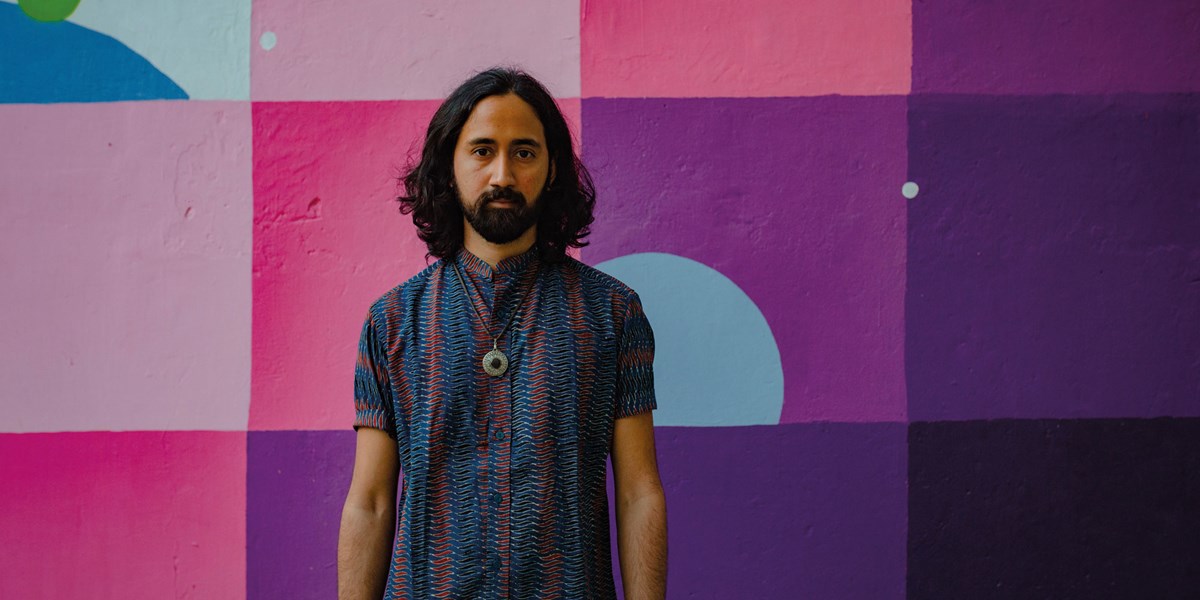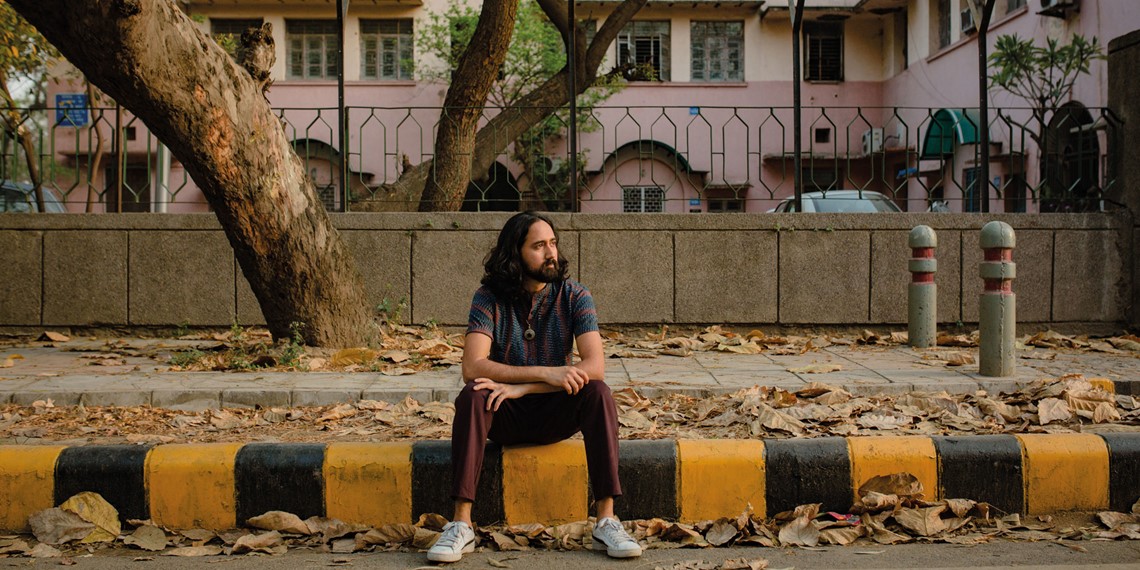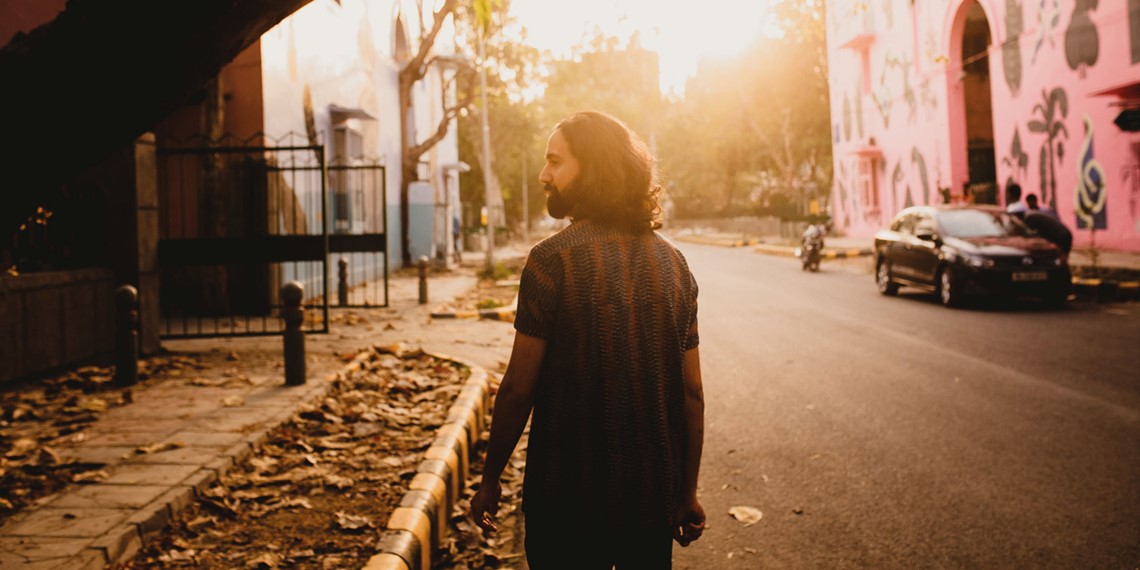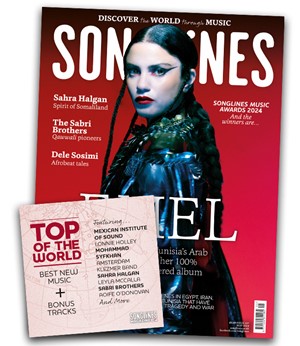Tuesday, April 21, 2020
Sarathy Korwar interview: “It takes guts and vulnerability to cut through the noise and find your own voice”
Sarathy Korwar is becoming an influential figure within London’s vibrant and eclectic music scene. He talks to Jane Cornwell about his latest project, inspired by Brexit Britain and the importance of changing the East-West narrative. Photographs by Rishabah Sood

“I want the idea of brown pride to come through,” says Sarathy Korwar of More Arriving, an album that features the multiple perspectives of rappers and MCs from the thriving young hip-hop scene that’s currently booming in large urban cities across the Indian subcontinent.
“These young people from very modest backgrounds in Mumbai and New Delhi are wearing their politics on their sleeve, and it takes guts and vulnerability to cut through the noise and find your own voice.”
More Arriving – which features Indian classical and jazz instrumentation and deftly placed electronica – is a conceptual take on its creator’s experience of living in the UK for over a decade; of being a contemporary Indian in an increasingly divided Britain. Crafted over two and a half years in India and the UK, the album is less about unity than it is about confrontation: “My voice is one among a thousand but this record is a snapshot of something much greater than myself. It’s the chance to send a message.”

Many messages. The album’s title is a play on the scaremongering that exists around Brexit, with the words a part of an excoriating poem recited by its author Deepak Unnikrishnan (‘Temporary people, illegal people, ephemeral people, gone people, deported, left, more arriving…’) on the tabla-propelled closer, ‘Pravasis’. “It’s this idea of battling the unknown, of being overrun, which is perpetuated by the media and mirrors the way our culture views outsiders,” says Korwar, 31, considered and articulate in a café in central London, not too far up the Jubilee line from his home in Cricklewood. “There’s also this tongue-in-cheek notion of, well, yeah, they’ve always come, they’re not going to stop coming. Deal with it.”
Then there’s the album’s cover art by designer Tushar Menon, a tribute to the street protests held in Britain in the 1970s and 80s when people of colour united to face down the racist National Front. It’s a springboard from which to investigate the eight tracks that rightly represent the diaspora as pluralistic and diverse: Delhi Sultanate is an MC who grew up in a Jamaican neighbourhood in Berlin and raps in patois alongside Punjabi MC Prabh Deep on ‘Coolie’, a tune that tells of the indentured Indian labourers exploited by British plantation owners in Jamaica.
London-based poet Zia Ahmed explores the lazy stereotypes that come with being British-Pakistani (‘I’m curry house/I’m rogan josh/I can do an Arabic accent’) on the qawwali-inspired ‘Bol’, while lead single ‘Mumbay’ (sic) features the syllabic fire of Bombay/Mumbai-born MC Mawali, spitting bars in 7/8 time in Marathi and Hindi, in a tale about a city with two personalities, two oppressive forces of power and narrative; that is, the colonial past and a present hijacked by right-wing nationalists. “It’s also about the rich/poor divide in the city, this hustle and bustle then at 7am in south Bombay you’ll come across a massive promenade that’s completely empty,” says the US-born, India-raised Korwar, whose accompanying Mumbai-shot video captures this duality. “The song is a love letter too.”
Five languages. Multiple backgrounds. A sea of stories. A new narrative.
Then there’s the music, which sees Korwar’s free-flowing jazz drumming undulating alongside some of the brightest stars in the London jazz firmament: reedswoman Tamar Osborn, bassist Ruth Goller, Kefaya pianist Al MacSween and synths wiz Dan Leavers, aka Danalogue from The Comet is Coming. The parallels between the much-touted new London jazz sound and the aforementioned desi rap scene are obvious, states Korwar. Both have a raw, cross-genre aesthetic. Both are collaborative and diverse. Both are in need of new narratives.

Indeed, just as the so-called ‘British Asian Underground’ scene of the late 90s (broadly held to encompass a blend of Eastern sounds with electro and drum’n’bass) overlooked the range of music on its fringes, making poster boys of the likes of Talvin Singh, Asian Dub Foundation and State of Bengal (all of whom shaped the young Korwar), so is the current London jazz explosion being hooked to the same handful of players. It’s at risk of being homogenised as a result.
“When the writer of an article wants to prove how diverse the London scene is I’ll get a mention,” says Korwar who, with fellow kit drummer Moses Boyd, was a recipient of a Steve Reid Innovation Award, and has collaborated with saxophonist/clarinettist Shabaka Hutchings. “I’m ascribed a spirituality because I play Indian classical music, and I’m often called a tabla player even though I predominantly play drums on my recordings. These ideas about what’s ‘exotic’ make you niche.” So how would he like to be perceived? A smile. “As one of the voices influencing a larger London scene.”
With his seamless mix of jazz, electronica and traditional instrumentation, Korwar is doing precisely that, and challenging the cultural appropriation of ‘spiritual’ Indo-jazz in the process. The son of an architect and a software consultant who met at UCLA in the US, Korwar grew up in Ahmedabad, the capital of the western state of Gujarat, listening to his parents sing Indian folk songs in between rocking out to The Doors and performing tunes by Jimi Hendrix on the tabla. He’d begun learning the hand drums – India’s primary percussion instrument – at the age of ten. A few years later, with the family now in Chennai on the east coast of Tamil Nadu, it was the drum kit that blew him away.
The American rock he was drawn to on the radio featured drummers – The Doors’ John Densmore, Mitch Mitchell from the Jimi Hendrix Experience – whose free-flowing style felt jazz-like, and the teenaged Korwar loved jazz. A teacher had fed his interest with classic albums by pianists Ahmad Jamal and Horace Silver. At a local jazz record shop he discovered the icons of ‘spiritual jazz,’ among them trumpeter Don Cherry, saxophonist Pharoah Sanders and Coltranes John and Alice, who’d all drawn inspiration from Indian music and philosophy.

But while their sounds moved Korwar, and remain salient influences, they unsettled him too: “Too many went over, learned a few scales and chants and came back, having only skimmed the surface.” The East he knew, that he was immersed in, was far more complex than it was portrayed in the West: as a repository of knowledge; a Shambhala. Then he discovered the Mumbai-born percussionist, Trilok Gurtu, whose blend of jazz and Indian traditions – scat singing with konnakol vocal percussion, say – felt revolutionary.
“Trilok was definitely one of my role models,” says Korwar, who also cites his tabla teachers, Rajeev Devasthali and Sanju Sahai. “He was the first brown face I saw who was playing the sort of things I wanted to play and doing them alongside jazz giants like John McLaughlin (from Shakti and the Mahavishnu Orchestra) and Joe Zawinul (from Weather Report).”
Having obtained a degree in environmental science in between composing and playing in bands, Korwar pitched up in London in 2009 to do a music diploma specialising in kit drumming, only to be left creatively unfulfilled (“They focused on churning out session players, and I wanted to develop my own voice”). He duly enrolled in a Masters in Music Performance at SOAS, University of London, where his dissertation – “taking the vocabulary of the tabla and transferring it onto non-Indian percussion instruments,” – would inform much of his later work.
As it would his politics: “People were always asking me if I’d felt a culture shock on coming to the UK, which was the shock,” he says. “I come from a very upper-class position of privilege in India. I went to an English-speaking school and had holidays abroad.” He pauses, sighs. “Being asked how many times I’d seen an elephant stopped being funny after a while.”
With the support of the Steve Reid Foundation, Korwar began recording what would become his acclaimed 2016 debut album Day to Day [a Top of the World review in #121], a work that features field recordings of Siddi musicians – mostly Sufi Muslims descended from East African Bantu people, whose chants, polyrhythms and malunga bow (a distant cousin of the berimbau) interact with electronics and improvisations from Korwar’s band on reeds, strings, bass and drums. The album caught the ear of cult electronic producer Kieran Hebden, aka Four Tet, who sent it to Ninja Tune, one of the hippest indie labels on the planet. Korwar got a call the next day.
“I got fast tracked,” Korway says with a grin. “I couldn’t have had a better start. I was always interested in people who did interesting stuff with electronics in ways other than dance music, like Björk, and wanted to mess with classical Indian music and electric voices.”
He was still in the process of creating More Arriving when, in 2018, he set about making a live recording, My East is Your West, in the round at the Church of Sound, a night staged at a deconsecrated church in Clapton by Total Refreshment Centre visionary, Alexis Blondin. The line-up mixed a jazz quintet with an understanding of Indian instrumentation with the five-strong UPAJ Collective of Indian classical musicians, most of whom – flautist Aravindhan Baheerathan, percussionist BC Manjunath – were well versed in jazz improvisation. Transcending generic assumptions about ‘Eastern-style’ music, it rebalanced the scales by revisiting 70s pieces by John McLaughlin, Pharoah Sanders, Alice Coltrane and others and put the Indian side front-and-centre.
“In the 70s there wasn’t the access to music we have now. Back then I think that ‘spiritual jazz’ was the only way people knew of the tabla or the sitar, but the manner in which those instruments are represented doesn’t do much for the traditions of music that those instruments come from. It boils down to a question of representation, really.”
Re-balancing is one thing. Trailblazing is another. In Indian classical music and in jazz, Korwar is reasonably unique in being a percussionist who is also bandleader (Zakir Hussain and Trilok Gurtu have done it), whether or not he’s playing tabla or kit drums. “It’s been very empowering,” he says, “as has combining the two approaches.”
“I’m at a vantage point where I’ve had time with both instruments and traditions separately as well as together, which not many do. I learned the drums in a conservatory and the tabla with a private guru; they were two methodologies in parallel until I was about 23 or 24. Bringing them together was revelatory.”
Korwar is quick to point out that in India, ‘guru’ simply means ‘teacher,’ a person you respect: “Growing up in India we tried to stay away from that mysticism because we knew the connotations it had in the West. When people asked if we were ‘spiritual’ we didn’t want to talk about it because it’s like, dude, that’s almost like selling out to the West’s idea of who you are. We’re going to define our relationship to our gods, our religions, in a way we want to.”
Korwar moves back and forth between the UK and India, where he has a fan base and continues to work in the vibrant hip-hop scene, with its outdated computer software and YouTube videos made on iPhones, that big brands are currently falling over themselves to appropriate.
With More Arriving, Korwar continues to represent.
“There is no one brown voice,” he says. “We’re many.”
Sarathy Korwar's album More Arriving has been nominated for a 2020 Songlines Music Award. Find out more: https://www.songlines.co.uk/awards/2020/sarathy-korwar

